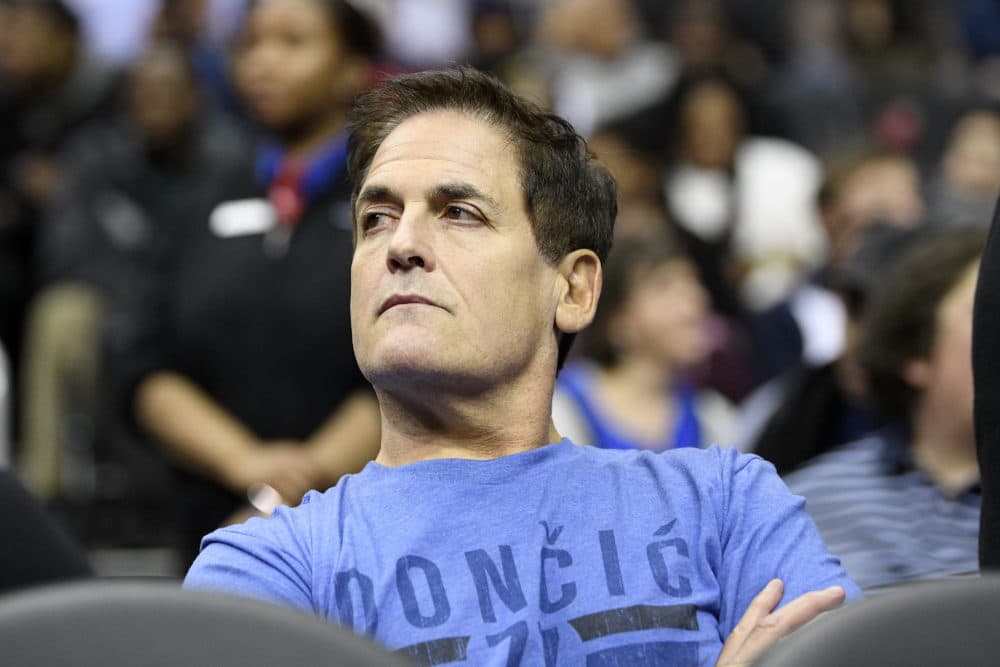Advertisement
Mark Cuban On Corporate Responsibility In A Crisis

We talk with Mark Cuban, the outspoken Dallas Mavericks owner and Shark Tank entrepreneur. He joins us to discuss corporate responsibility and the need for innovation in a crisis.
Guest
Mark Cuban, entrepreneur, investor and owner of the Dallas Mavericks since 2000. Investor on the ABC reality television series, "Shark Tank." (@mcuban)
Jack Beatty, On Point news analyst. (@JackBeattyNPR)
Interview Highlights
On his decision to pay hourly workers for the rest of the Dallas Mavericks’ suspended season
“What was going to happen to all the people that worked for me and all the people that were in the arena that night? You know, that were just doing their job. They live paycheck to paycheck. Get paid by the hour, never have 100% certainty on the number of hours they were going to have. And so that was my first thought. And then the first reaction was, ‘OK, we're going to pay all of them no matter what.’ Because once the hourly workers in the arena hear that the season is suspended, that's going to be their first thought: ‘How am I going to pay the bills?’ And I wanted to answer that thought with, ‘We'll keep on paying you as if the season were continued to be played and you don't have to worry about it.’”
"I wanted to answer that thought with, ‘We'll keep on paying you as if the season were continued to be played and you don't have to worry about it.’”
Mark Cuban
Do you see this as a moment where how business is done in the United States could or should change?
“Of anything as devastating and dangerous as the coronavirus has been, it's also been a great equalizer. I mean, it can affect anybody. But within the business construct, just the idea that everybody has got to do their job or participate in a way that works for not just the business, but for individual families, but also customers. And so, I think it doesn't matter what your role is. Each role is of equal importance.
"The CEO is of no more importance than somebody cleaning the floors or that takes a bucket and mops the floors. I think that this is a time as a reset where we really have to reevaluate how we treat workers, how people are paid, how can we get them into a role where they receive an equity as part of their compensation. So that they're not having to live paycheck to paycheck, they have something that appreciates. All these things I think are important as we go through this reset in business.”
"This is a time as a reset where we really have to reevaluate how we treat workers, how people are paid."
Mark Cuban
What do you think the future might hold for businesses or business leaders that don't see this catastrophe as an opportunity to pivot to something better?
“Their brand is going to get destroyed. I mean, how you treat your employees today will have more impact on your brand in future years than any amount of advertising, any amount of anything you literally could do. Because, again, we're all suffering from this. Every single person is looking to see how their company is treating them, how their employers are treating family members and friends.
"And we live in a social media universe now. And when people are not treated well, everybody around them is going to know. It used to be, you know, the business mantra was, ‘If you do something good, one person hears about it. If you make a mistake, 20 people hear about it.’ Now, if you do something good or bad, hundreds, if not thousands and potentially millions of people read or hear or see it.”
"How you treat your employees today will have more impact on your brand in future years than any amount of advertising, any amount of anything you literally could do."
Mark Cuban
What makes this moment any different?
“Because this moment is the definition of different. And this moment is something that is defining us all and changing us all from the top of the food chain to the economic bottom of the food chain. And because of that, it's a unique opportunity for workers to speak their voice. The government, for the first time ever, is providing loans that don't have to be repaid. And that's everybody's taxpayer money, so we should have a voice there as well.
"And so while I understand your point and I'm a cynic at heart as well, that you can't expect all corporations to be good, compassionate capitalists. If they were, we wouldn't see the rise of Bernie Sanders at all. And Democratic socialism wouldn't be a discussion at all. But now is a different time. Now is a time when every employee should speak up and really be able to say, ‘Look, let’s look at this differently. Let's do this differently, because you're going to need me as much as I need you.’
"And it's not going to happen across the board. I mean, the cynic in me says, ‘Of course, you know, some big percentage of companies aren't going to get it.’ But at the same time, if enough companies do get it, and those companies do better, and set a prime example of how a company should be run in America 2.0, then I think that's how you get momentum."
Advertisement
"If enough companies do get it, and those companies do better and set a prime example of how a company should be run in America 2.0, then I think that's how you get momentum."
Mark Cuban
On ‘compassionate capitalism’
“Workers have a platform. You have the gig economy that you'll compete with forever. And so you'll see a lot more workers who are free agents, if we can use that term. You know, way back when people used to get a job at a big company and look for a career and retire with a gold watch and a pension. Those days are long gone. And because companies have gone away from that, now workers recognize that they're free agents.
"And they're only going to stay if what you offer them is better than what the company down the street offers them. And so if you want to retain your workers, which is going to be critically important in America 2.0, as we transition to the other side, then you're going to have to treat them better. You're going to have to reward them. You're going to have to practice compassionate capitalism.
"And the company that, as we discussed earlier, that doesn't treat their workers well, their brands are going to suffer. Their business is going to suffer. And, you know, the compassionate companies are going to do better. And on top of that, the political aspects of it. You know, you've got the right and you've got the left. And the reality is this is a chance to do it again. And reset capitalism to where everybody is treated fairly and considerately."
"If you want to retain your workers ... then you're going to have to treat them better. You're going to have to reward them. You're going to have to practice compassionate capitalism."
Mark Cuban
Would you consider raising the wages of hourly workers?
“I’ll tell you what I do with my company. It would have been embarrassing for me to find out if any employee of mine was on government employment, or getting any type of government assistance at all. Because that tells me I wasn't paying them enough to support their family. And so I went and had people go through and check as best we could, because not everybody is going to tell you if they're getting assistance. And we raised wages and we gave them enough to make sure that they weren't on public assistance.
"And I think that's the way every company could be, should be. Because to me, as a capitalist, if I'm paying so little that my fellow taxpayers have to subsidize my company, that's just wrong. That's not capitalism. That's the ultimate socialism. I'm taking from other taxpayers to subsidize my company, my employees. And so, yes, I'm a firm believer that at least $15 has got to be the minimum national minimum wage.”
"To me, as a capitalist, if I'm paying so little that my fellow taxpayers have to subsidize my company, that's just wrong. That's not capitalism."
Mark Cuban
Sydney Wertheim transcribed this interview for the web.
From The Reading List
Poetry Foundation: "'Calling Him Back from Layoff' by Bob Hicok —
"I called a man today. After he said
hello and I said hello came a pause
during which it would have been
confusing to say hello again so I said
how are you doing and guess what, he said
fine and wondered aloud how I was
and it turns out I’m OK ..."
Bloomberg: "Mark Cuban Says 3M Fails to Stop Profiteers of Masks" — "Billionaire Mark Cuban has been trying to do his part to help hospital workers get more protective equipment, working with a non-profit group and delving into the market himself to find gold-standard N95 respirator masks he could buy for medical personnel."
CNBC: "Chime pilots way to get $1,200 stimulus checks to users instantly after talks with Mark Cuban" — "Chime, the biggest U.S. digital bank start-up, is piloting a way for its users to receive their federal $1,200 stimulus checks instantly, weeks before the government is expected to send the payments."
Axios: "Mark Cuban opens door to 2020 run" — "Businessman and Dallas Mavericks owner Mark Cuban revived talk of an improbable 2020 presidential bid during an Axios virtual event on Friday."
CNBC: "Mark Cuban says how companies treat workers during pandemic could define their brand ‘for decades’" — "Billionaire entrepreneur Mark Cuban on Wednesday warned companies against sending employees back to work too soon during the coronavirus pandemic."
Forbes: "NBA Season Possibly In Jeopardy After Events In China Despite Mark Cuban’s Optimism" — "There’s still not an official timetable for when the NBA could begin playing games again. The league shut down its season on March 11 due to concerns over the spread of COVID-19 after Utah Jazz center Rudy Gobert tested positive for the disease. Even with continued uncertainty, some are hopeful that the season will resume."
This program aired on April 7, 2020.

